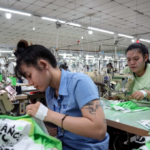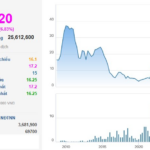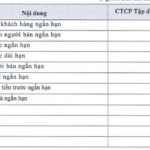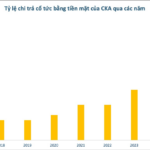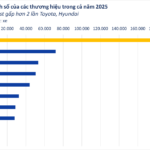This development comes just three months after Ms. Vinh sold nearly 2.2 million STH shares, equivalent to 11.05% of the capital, on June 5th, through a deal at an average price of VND 20,400 per share, 7% higher than the closing price that day. Assuming a current price of VND 20,000 per share, it is estimated that the STH Chairman will need to spend VND 70 billion to complete this new acquisition.
|
At the 2025 Extraordinary General Meeting of Shareholders held in late July, Ms. Vinh was elected to the Board of Directors for the 2023-2027 term and was appointed as Chairman of the Board. Also at this meeting, the entire previous Board of Directors and Supervisory Board resigned en masse due to personal reasons, leading to the reelection of the entire leadership structure.
Among those who resigned was Ms. Nguyễn Thị Quy, Ms. Vinh’s sister, who previously served as General Director and Member of the Board of Directors. Ms. Quy was relieved of her duties in early July and sold all 500,000 STH shares (2.56% of capital) on August 21st, earning nearly VND 12 billion.
Major Shareholder Changes
In parallel with the leadership changes, the composition of major shareholders also underwent significant changes. Thai Hung Trading Joint Stock Company, the family business of Ms. Vinh and Ms. Quy, successfully sold over 8.6 million STH shares from August 5th to August 21st, reducing its ownership from 52.31% to 8%, equivalent to 1.56 million shares. The transaction value is estimated at over VND 207 billion, with an average price of nearly VND 24,000 per share.
Mr. Le Tuan Dung, who replaced Ms. Quy as General Director of STH, registered to purchase nearly 4.2 million STH shares from August 5th to September 3rd to increase his ownership from 0% to 21.36%, but has not yet reported the results. STH Gateway One-Member Limited Liability Company, where Mr. Dung serves as General Director, also plans to buy an additional 6.5 million STH shares during the same period to increase its stake from 24.9% to over 58.4%.
Previously, in mid-June, STH Gateway acquired more than 4.5 million STH shares, increasing its ownership from 1.69% to nearly 25% and officially becoming a major shareholder.
STH Gateway, formerly known as Pearson Gateway Limited Liability Company, is headquartered in Hanoi and operates in the field of education with a charter capital of VND 50 billion. It is wholly owned by Mr. Le Tuan Dung. In late May 2025, Thai Hung Company held an event to introduce Pearson Gateway as its strategic investor.
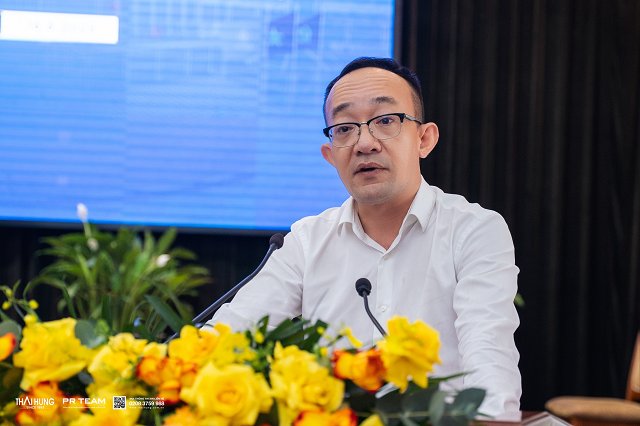
Mr. Le Tuan Dung at the event introducing the strategic investor of Thai Hung Company
|
Emergence of a New Investor
In August, STH welcomed another new institutional major shareholder, Sigma Group Joint Stock Company. This enterprise purchased nearly 4.2 million shares, equivalent to 21.36% of the capital, through a deal on August 15th at an average price of VND 24,000 per share, 8% higher than the closing price on the same day.
Notably, Sigma Group was established on the same day as STH Gateway (March 31, 2025), operates in the field of education, and shares the same address at 6 Le Thanh Ton, Cua Nam (new), Hanoi. Its current chartered capital is VND 15 billion, founded by three individuals, including Director Nguyen Thi Thao, who holds 30%.
Against the backdrop of active trading, the STH share price fell for eight consecutive sessions, currently standing at VND 20,000 per share, an 9% decrease over the week but still reflecting a 12% increase over the past three months and a significant 194% surge over the year. Average trading volume reached over 37,000 shares per session. The code previously hit a historical peak of VND 25,300 per share on August 18th before retreating 21% to the current level.
| STH Share Price Movement over the Past Year |
– 13:00 29/08/2025
The Ultimate Guide to Investing: Unlocking the Secrets to Financial Freedom
“Former Chairwoman of the Board of Directors of Hong Ha Food Industry Corporation (HOSE: HSL), Ms. Nguyen Thi Tuyet Nhung, has completely divested her 12.44% stake in the company, officially exiting the shareholder registry. This development comes amidst a surge in HSL’s stock price, which has climbed to historic highs, witnessing a remarkable increase of over 275% in just three months.”
“Acquiring More: Tân Thành Đô’s Ambitious Plans for CTF Shares”
New City Group, a prominent Vietnamese company, has recently announced its intention to acquire an additional 3 million shares of City Auto Joint Stock Company (HOSE: CTF) between August 28 and September 26, 2025. This move underscores New City Group’s strategic expansion plans and its confidence in the potential of City Auto, a well-known name in the automotive industry.



